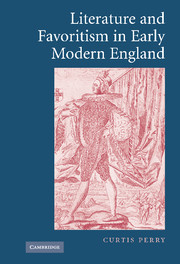Book contents
- Frontmatter
- Contents
- Acknowledgments
- A note on texts
- 1 “Prerogative pleasures”: favoritism and monarchy in early modern England
- 2 Leicester and his ghosts
- 3 Amici principis: imagining the good favorite
- 4 Poisoning favor
- 5 Erotic favoritism as a language of corruption in early modern drama
- 6 “What pleased the prince”: Edward II and the imbalanced constitution
- 7 Instrumental favoritism and the uses of Roman history
- Afterword: “In a true sense there is no Monarchy”
- Notes
- Index
4 - Poisoning favor
Published online by Cambridge University Press: 22 September 2009
- Frontmatter
- Contents
- Acknowledgments
- A note on texts
- 1 “Prerogative pleasures”: favoritism and monarchy in early modern England
- 2 Leicester and his ghosts
- 3 Amici principis: imagining the good favorite
- 4 Poisoning favor
- 5 Erotic favoritism as a language of corruption in early modern drama
- 6 “What pleased the prince”: Edward II and the imbalanced constitution
- 7 Instrumental favoritism and the uses of Roman history
- Afterword: “In a true sense there is no Monarchy”
- Notes
- Index
Summary
It is a curious truth about Tudor and early Stuart England that any royal favorite of sufficient longevity and influence to attract resentment tends to have been accused, in the most spectacularly public manner possible, of using poison. Favorites, moreover, are accused of poisoning in a sizeable body of texts of different kinds: libels, legal records, topical dramatic fictions. One wants to know why this scandalous figuration should have proved so persistent: why, that is, this particular trope should have seemed as apt and plausible as it clearly did, and in what ways was it useful or clarifying to English subjects concerned about perceived political corruption? These are the questions that I aim to take up in the present chapter by pursuing the shared presuppositions, anxieties, and representational strategies of the body of texts that popularized the figure of the poisoning favorite.
Though the so-called historical cases are individually well known, it remains striking to consider them together. Leicester's Commonwealth (1584), the ur-text of early modern favoritism, accuses the Earl of Leicester of poisoning a remarkable number of sexual and political rivals. Indeed, poison is so prominent in that text's construction of the earl that his failure to use this method to kill his wife Amy Robsart occasions comment. “I muse,” says the lawyer, “why he chose rather to make her away by open violence than by some Italian confortive.”
- Type
- Chapter
- Information
- Literature and Favoritism in Early Modern England , pp. 95 - 130Publisher: Cambridge University PressPrint publication year: 2006

